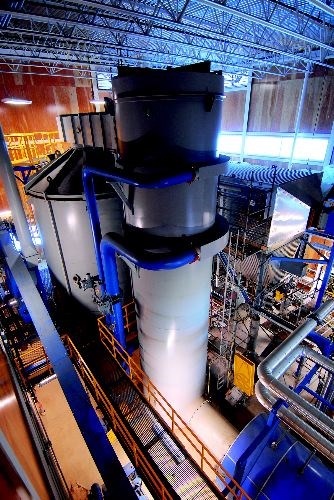Recent third-party testing and analysis of the biomass gasification system at University of Northern British Columbia (UNBC) has concluded the plant is one of the cleanest in North America.
Supplied and installed by Nexterra Systems Corp., the plant's emissions for particulate matter, volatile organic compound, carbon monoxide and nitrogen oxides were measured by Levelton Consultants Ltd., an engineering and science consulting firm.
It emerged with impressive scores when compared to 17 other plants of a similar scale built in Canada and the United States in the last decade.
Emissions for particulate matter were 18 times lower, while those for carbon monoxide were 65 times lower, those for volatile organic compounds were 37 times lower and those for nitrogen oxides were two times lower.
"These are impressive emissions results and we applaud UNBC and Nexterra for this accomplishment," said BC Bioenergy Network executive director Michael Weedon in a press release issued Thursday.
"As distributed biomass heat and power solutions become more integrated into communities, ultra low emissions, reliability, fuel versatility and efficiency as demonstrated by Nexterra, will become increasingly important for widespread adoption in North America."
The plant also compared well in relation to U.S. Environmental Protection Agency standards for air emissions regulatory factors for natural gas, with emissions two times lower for particulate matter, 21 times lower for carbon monoxide, 11 times lower for volatile organic compounds and on par for nitrogen oxides.
"We are delighted with these latest test results," said Nexterra president and chief executive officer Jonathan Rhone in the press release.
"We are seeing a growing trend across North America that communities want distributed biomass heat and power solutions provided that they do not result in a net degradation of air quality. We are very pleased to help UNBC deliver on this commitment to the citizens of Prince George."
Built at a cost of $22 million to provide heat to most buildings on campus, the system began operating in March. The system turns wood waste into a gas before it's used to fire boilers that produce hot water to heat UNBC. High-tech pollution technology called an electrostatic precipitator reduces the air pollution emissions to that of clean-burning natural gas.
It's expected to displace up to 85 per cent of UNBC's natural gas consumption, reducing greenhouse gas emissions by up to 3,500 tonnes per year, the equivalent of removing nearly 1,000 cars off the road.
In 2010, it was selected as the top campus sustainability project in North America by the Association for the Advancement of Sustainability in Higher Education (AASHE), the largest college-university sustainability organization in the world.

.png;w=120;h=80;mode=crop)

